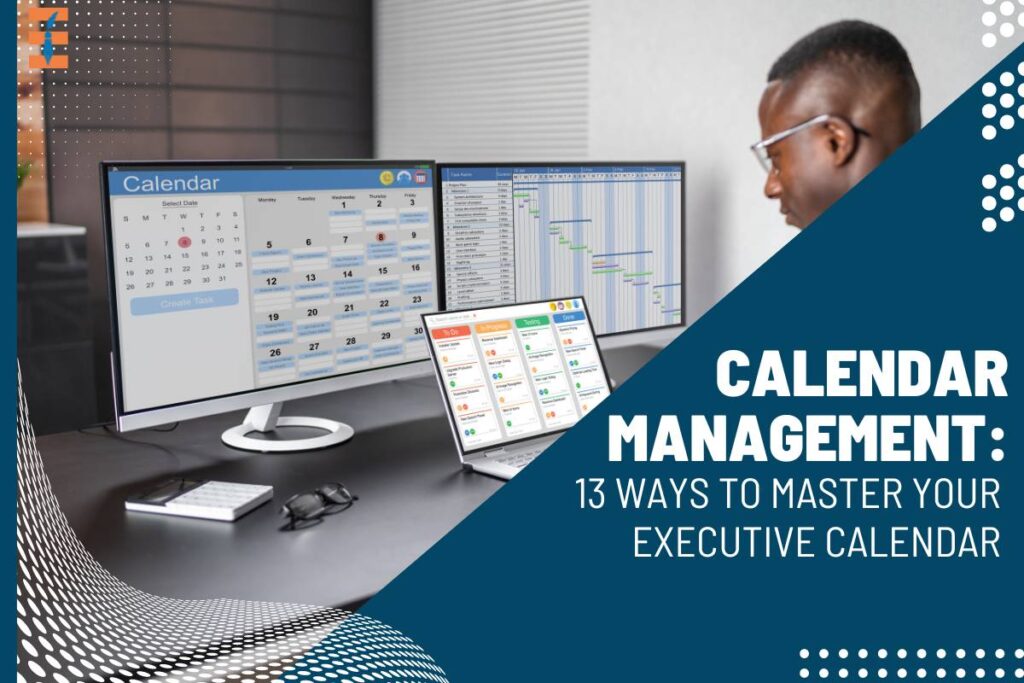In the fast-paced world of business, effective calendar management is a crucial skill for executives striving to maximize productivity and maintain a healthy work-life balance. A well-organized calendar not only ensures that important tasks and meetings are prioritized but also helps prevent burnout. In this article, we will explore 13 key strategies to master executive calendar management and achieve optimal efficiency.
Here are strategies to Master Your Executive Calendar:
1. Embrace Digital Tools
To streamline calendar management, leverage digital tools such as Google Calendar, Microsoft Outlook, or other specialized apps. These tools offer features like reminders, event categorization, and synchronization across devices, making it easier to stay organized.
2. Prioritize and Set Goals
Start by identifying your top priorities and goals. Allocate time slots in your calendar for tasks that align with your strategic objectives. This approach helps you focus on what truly matters and avoids getting bogged down by less critical activities.
3. Time Blocking

Implement the time-blocking technique to allocate specific blocks of time to different types of activities. This not only enhances concentration by minimizing multitasking but also ensures that each aspect of your role receives dedicated attention.
4. Strategic Scheduling
Be strategic when scheduling meetings and appointments. Cluster similar tasks together to minimize context switching, and try to schedule meetings during periods when you’re most alert and productive. This approach optimizes your energy levels for various types of activities with calendar management.
5. Buffer Time
Incorporate buffer time between meetings and appointments. This provides breathing room for unexpected delays or last-minute tasks, reducing stress and ensuring that you can maintain your schedule even in the face of unexpected challenges.
6. Delegate Responsibly
Delegating tasks is a key skill for executives. Review your calendar and identify tasks that can be efficiently handled by others. Delegating not only frees up your time for more strategic responsibilities but also fosters team empowerment.
7. Learn to Say No

While it’s essential to be open to collaboration, learning to say no is equally crucial. Assess your capacity realistically and decline commitments that may overwhelm your schedule. This skill ensures that you can fulfill your existing responsibilities effectively.
8. Regularly Review and Adjust
Set aside time each week to review your calendar and make adjustments as needed. This proactive approach allows you to adapt to evolving priorities, reschedule tasks, and ensure that your calendar remains aligned with your goals.
9. Utilize Color Coding
Employ color-coded categories for different types of activities. This visual aid allows for quick identification of tasks and events, making it easier to manage your time effectively and prioritize accordingly.
10. Maximize Commute Time
If you have a commute, utilize that time wisely. Listen to podcasts, audiobooks, or make phone calls to catch up on non-intensive tasks. This transforms what could be unproductive time into an opportunity to stay informed and connected.
11. Invest in Automation
Leverage automation tools to handle routine and repetitive tasks. This can include setting up automated responses for emails, using scheduling tools for routine meetings, and automating reminders. Automation minimizes manual effort, freeing up more of your time.
12. Incorporate Personal Time
Recognize the importance of personal time in maintaining a healthy work-life balance. Schedule breaks, exercise sessions, and moments for relaxation. A balanced calendar contributes not only to professional success but also to overall well-being.
13. Continuous Learning

Stay updated on the latest productivity techniques and calendar management strategies. Attend workshops, read books, and follow thought leaders in the field to discover new approaches that can enhance your executive calendar management skills.
Conclusion:
Mastering executive calendar management is an ongoing process that requires a combination of discipline, strategic thinking, and adaptability. By embracing digital tools, prioritizing tasks, and implementing effective time management techniques, executives can optimize their schedules to achieve peak productivity and maintain a healthy work-life balance. The 13 strategies outlined in this article provide a comprehensive guide to help executives take control of their calendars and navigate the complexities of modern business with confidence.
FAQs on Executive Calendar Management:
1. How can digital tools improve executive calendar management?
A: Digital tools such as Google Calendar and Microsoft Outlook offer features like reminders, categorization, and synchronization, streamlining the organization of tasks and meetings. These tools enhance accessibility and provide a centralized platform for efficiency.
2. What is the significance of time blocking in executive calendar management?
A: Time blocking involves allocating specific time slots to different activities, minimizing multitasking, and enhancing focus. It ensures that executives dedicate focused attention to each aspect of their role, contributing to increased productivity and task efficiency.
3. Why is it important to incorporate buffer time into the executive calendar?
A: Buffer time acts as a cushion between meetings and appointments, allowing for unexpected delays or last-minute tasks. This proactive approach reduces stress, ensures punctuality, and enables executives to handle unforeseen challenges without disrupting their entire schedule.
4. How does automation contribute to effective calendar management for executives?
A: Automation tools handle routine and repetitive tasks, such as setting up automated email responses or using scheduling tools for routine meetings. By automating these processes, executives can minimize manual effort, save time, and focus on more strategic responsibilities.
5. What role does continuous learning play in mastering executive calendar management?
A: Continuous learning keeps executives informed about the latest productivity techniques and calendar management strategies. Attending workshops, reading books, and staying updated on industry trends empowers executives to adapt and incorporate new approaches, enhancing their overall calendar management skills.










